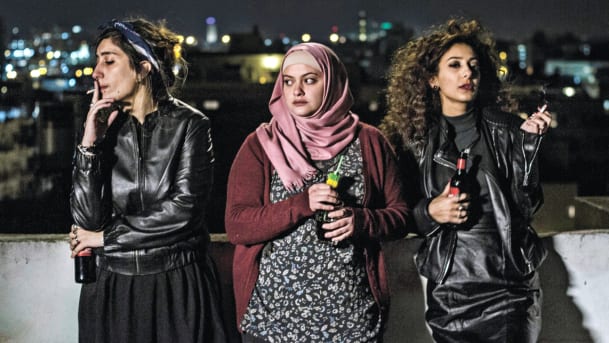 A daring debut film from Maysaloun Hamoud tells a story of Palestinian women living in Israel and defying conservative norms by choosing to live modern secular lifestyles.
A daring debut film from Maysaloun Hamoud tells a story of Palestinian women living in Israel and defying conservative norms by choosing to live modern secular lifestyles.
Young Palestinian women living in Tel Aviv are the protagonists of In Between, the debut feature film written and directed by Maysaloun Hamoud. The picture has understandably attracted attention because two of the characters are modern, secular, and extremely rebellious against traditional conservative culture, both Muslim and Christian.
Leila, played by Mouna Hawa, is a fashion-conscious lawyer who loves to party—with her big curly hair and leather outfits she definitely stands out. Her roommate Salma, played by Sanna Jamelieh, works as a cook while moonlighting as a DJ at parties and raves. The film opens with a raucous celebration for the third roommate, who is getting marrying and moving away. What strikes one first, of course, is seeing these women dancing, smoking, drinking, and taking drugs—and the presence of a gay male friend is underlined as well—but with time we see the tensions between their lifestyles and the surrounding pressure to conform to more traditional roles that surround them.
Then, another woman enters their lives—Nour, played by Shaden Kamboura—recommended by the departing roommate to stay with them while she finishes her computer science degree. Nour is a traditional Muslim; she wears a hijab, a scarf covering her hair; and of course she is not wholly at ease with the freewheeling lifestyle of her new roommates. But her attitude is delicate and withdrawn, even a little curious, not sternly disapproving, but as friendly as she is capable of being. It turns out she’s engaged to a strict fundamentalist type, and when he visits her he is shocked at the behavior of Leila and Salma. This tension is one of the movie’s more powerful plot strands. There is trouble in the romantic relationships of the other two as well, and some bitter conflict between Salma and her family, who are Christians.
The political situation for Arab citizens of Israel is only hinted at, insofar as it affects them personally, and this is just one example of the director’s admirable restraint. It would have been easy to stereotype these young women, but instead we really get to know and understand them as individuals. They are not remote from society around them, but clearly a part of it.
What has made the film especially controversial, I think, is that these women refuse to be passive and obedient. They choose to live the way they want to, without compromise. The title In Between refers to that condition that is not quite complete freedom, that still seeks to maintain some ties to family and cultural background while being true to oneself—and the movie demonstrates how difficult that place can be, especially in this particular society.
The film caused such outrage in conservative Palestinian circles that a Muslim court issued a fatwa against the director, Maysaloun Hamoud, the first time such a ruling has been made against a Palestinian since 1948. In this case I don’t think it means a death sentence, but it is a strong condemnation against her as a filmmaker. Hamoud is a feminist, and expresses pride without any regrets for her film. In Between is an important statement, but it’s also very entertaining. One comes away from the movie grateful to have known these fascinating and vibrant women characters.

The life of a family in the Italian Alps in 1944 is profoundly affected by the presence of a Sicilian deserter. Vermiglio, a new...

Joseph Mankiewicz’s 1953 version of Julius Caesar, starring James Mason, John Gielgud, and Marlon Brando, is one of the few Hollywood renderings of Shakespeare...

One summer in the life of a woman in an “alternative” lifestyle, and her relationship with her introverted 11-year-old daughter. The title of renowned...